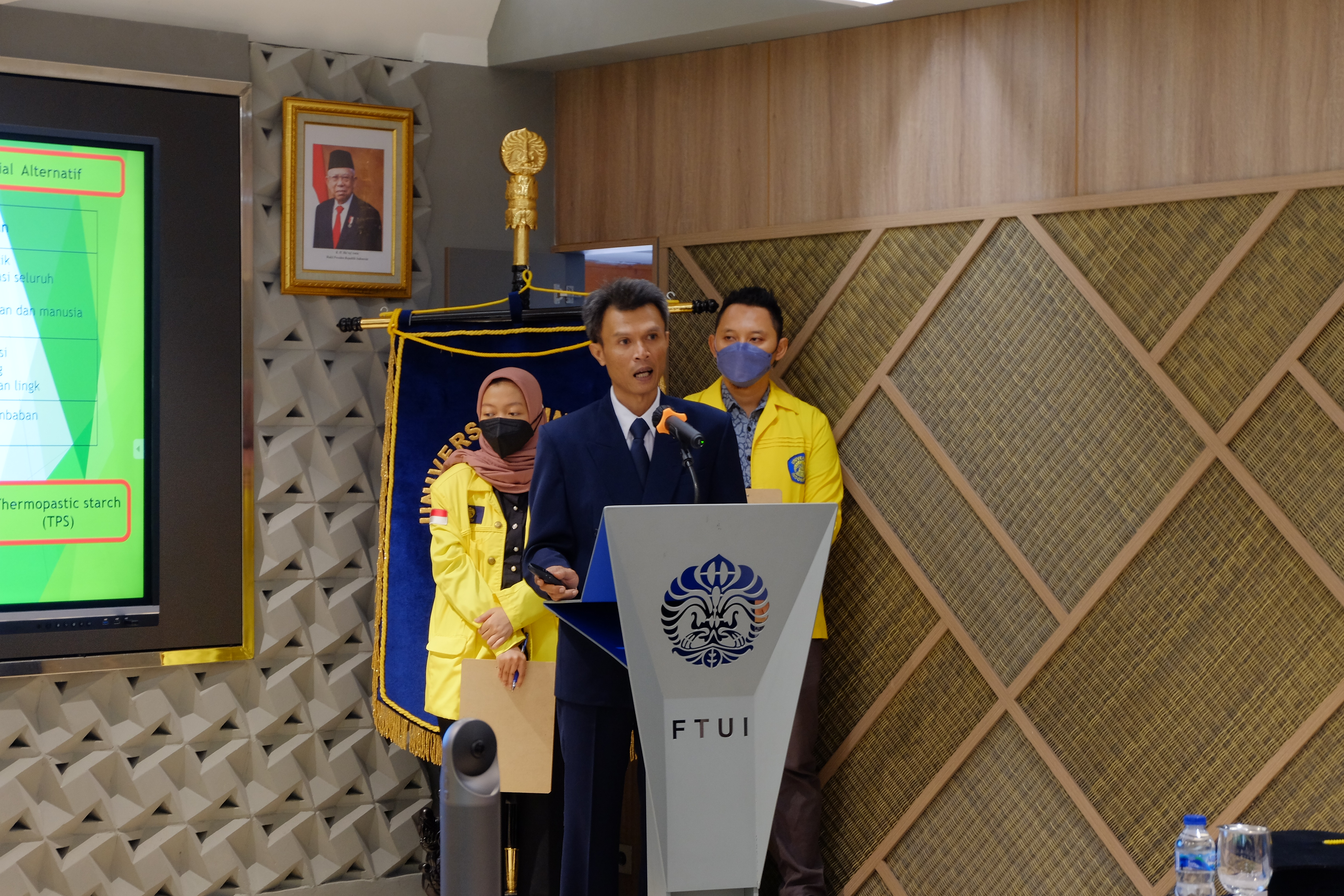The plastics that are widely circulating today are synthetic plastics derived from crude oil and natural gas. Plastic is difficult to degrade (non-biodegradable) because it does not come from biological compounds. To decompose completely, plastic is estimated to take 100 to 500 years. Therefore, the use of plastic and the problem of plastic waste need serious handling.
In general, handling plastic waste can be done curatively and preventively. Curative waste management is carried out through the recycling process, while preventive is carried out by developing alternative materials in the form of bioplastics.
One of them is Thermoplastic Starch (TPS) a bioplastic material to replace petroleum-based materials. Currently, the use of TPS still has several weaknesses, including sensitivity to water and humidity as well as low mechanical and thermal properties.
The issue of developing and modifying TPS was discussed by Muhammad Ghozali in his dissertation in the Doctoral Program in Metallurgy and Materials Engineering, Faculty of Engineering, Universitas Indonesia (FTUI), entitled “Utilization of Palm Starch Waste and Tapioca Liquid Waste as Bioplastics for Flexible Packaging”. This dissertation was presented at the FTUI Doctoral Promotion Session which was held last month at the UI Campus, Depok.
Currently, TPS can be made from starch derived from rice, corn, wheat, potatoes, and cassava. However, these starch sources intersect with the people’s main food sources, so it is necessary to further investigate alternative natural starch sources that do not affect Indonesia’s food security. In his research, Muhammad Ghozali used palm starch (Arenga pinnata) as an alternative starch source.
“To overcome the weakness of TPS, it can be done by modifying starch chemistry, adding reinforcement, and mixing with biopolymer. Chemical modification of starch can be done by the oxidation method, and the addition of reinforcement can be done with cellulose fibers. Whereas with other polymers it can be done with polylactic acid, or in my research using bacterial cellulose from tapioca liquid waste,” said Muhammad Ghozali.
TPS modifications made by Muhammad Ghozali showed an increase in density, tensile strength, viscosity, and thermal resistance. The combination of the in situ TPS modification method, the addition of Nata de Cassava additives, and the addition of PolyLatctic Acid (PLA) simultaneously will significantly improve the mechanical properties and increase the thermal resistance of the resulting biocomposites.
“From the research results of Dr. Muhammad Ghozali, it can be seen that the use of palm starch as a new starch source is very potential in the manufacture of TPS. The biocomposites produced in this study have the potential to be used as a single-use plastic substitute. It is hoped that in the future this research can be carried out in more depth to overcome the weaknesses of thermoplastic starch in the development of alternative materials to replace conventional petroleum-based plastics,” said the Dean of FTUI, Prof. Dr. Heri Hermansyah, ST., M.Eng., IPU regarding this research.
Muhammad Ghozali earned his doctorate with a perfect GPA of 4.00 and a Cum Laude predicate. He is the 57th Doctor who graduated from the Department of Metallurgy and Materials Engineering and the 478th Doctor at FTUI. The Doctoral Promotion Session was chaired by the Chairman of the Session, Prof. Dr. Ir Muhammad Anis, M.Met., with Promoter Dr. Mochamad Chalid, S.Si., M.Sc.Eng., and Co-Promoter, Prof. Dr. Yenny Melia, S.T., M.Sc. The Examiner Team consists of Prof. Dr. Ir. Akhmad Herman Yuwono, M. Phil. Eng .; Prof. Dr. Ir. Dedi Priadi, DEA.; Prof. Dr. Ir. Anne Zulfia Syahrial, M.Sc.; Drs. Nofrijon Sofyan, M.Si, Ph.D .; and Dr. Asmuwahyu Saptoraharjo.
***
Bureau of Public Communications
Faculty of Engineering, Universitas Indonesia

